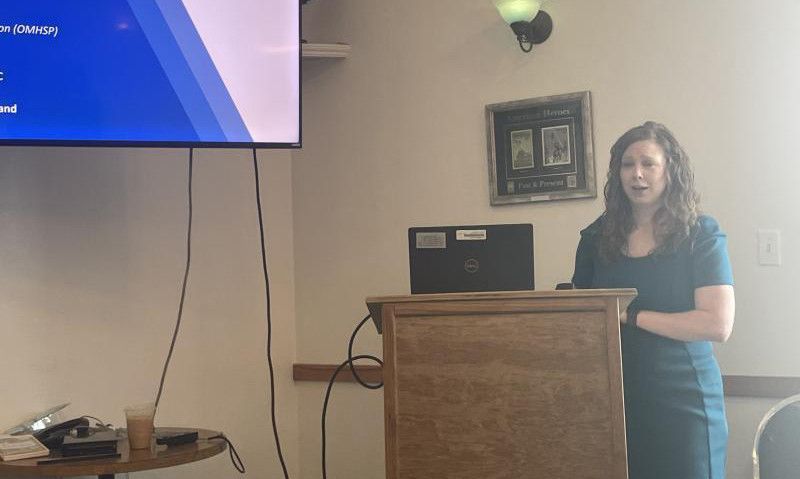
Legion post educates how to ‘Be the One’ with VA S.A.V.E. training
When Dean Erck returned home from The American Legion’s 103rd national convention in Milwaukee last August, he turned his focus to how he and his Legion post could answer National Commander Vincent J. “Jim” Troiola’s call to “Be the One.”
“Just like the race car at the national level, (John B. Lyman American Legion Post 904 in Alexandria Bay, N.Y.) was going to draw eyes to the issue to try to destigmatize someone struggling asking for help,” said Erck, Post 904 adjutant and service officer.
To answer the call to Be the One, Post 904 recently held a VA S.A.V.E. training class at the post home. The acronym stands for:
S - Signs of suicidal thinking should be recognized.
A - Ask the most important question of all, “Are you thinking of killing yourself?”
V - Validate the veteran’s experience.
E - Encourage treatment and expedite getting help.
“The training reviews the scope of veteran suicide within the United States, how to identify a veteran who may be at risk for suicide, and then what to do when you identify a veteran who may be at risk for suicide,” said Kaitlynn Tredway, community engagement and partnership coordinator for Watertown VA Community Based Outpatient Clinic in New York, who taught the training.
Attendees of the training included Legionnaires, Sons of The American Legion and Auxiliary members from Post 904 and other nearby posts, Department of New York Commander Dave Riley and his wife Laurie, and community members.
“A great cross-section of people with different reasons for attending but all focused on the mission of reducing suicide,” said Erck, who added that he was impacted by something someone at a suicide prevention walk said when he was talking about destigmatizing the asking for help.
The person said, “‘We don’t ask for help! No one asks for help for lots of things. But when we see an elderly man struggling to shovel his sidewalk or a mom struggling to open her car door to get her kids and groceries in, we just help them.’ I thought a lot about the truth of that statement and thought, what is preventing us from offering help? What is preventing us from noticing, reaching out, knowing what to say and being the one for someone struggling?
“It came down to the fact that, you know, people don't recognize the signs. They don't know what to do if they do recognize the signs or what to say, and they don't know where to get help. This VA training is geared towards you recognizing the signs and giving you some tools to speak to people about it.”
For Riley, the VA S.A.V.E. training “reiterated to me again what to ask for, how to talk, how to listen. That's the main thing of you want to let that veteran talk to so you get an idea of what's going on with them at that particular moment. It's going to make people more comfortable asking that difficult question, ‘Are you going to commit suicide?’, because you have to be straight up about it and that's not an easy question to ask somebody.
“Just verbalizing those words makes a difference to make it more comfortable for you, because the more you verbalize it, the easier it is you can ask that that hard question.”
The hour-long training incudes role-playing where attendees asked the person across from them, “Are you thinking of killing yourself?”
“I was struck by how hard it was to look someone in the eye and ask, ‘Are you thinking about hurting yourself?’ Even when you're role playing it's hard to actually get that out,” Erck said. “So this definitely gives you an opportunity to practice something that you hope you don't have to use. But if you ever do, you want to feel confident that you're able to do it.
“We need to just get more people educated about the impact (of VA S.A.V.E. training).”
Riley agreed.
“This is a training that we need across the country at the post level,” he said, adding that he is looking to host a training class during the Department of New York’s convention.
American Legion posts interested in hosting a VA S.A.V.E. training class can facilitate it through their local VA Medical Center’s suicide prevention team. A post can locate contact information for their local suicide prevention team through the Veterans Crisis Line Resource using this link. Once on the website, enter a ZIP code and press search. Then select the box next to Suicide Prevention Coordinators and press search again. Once completed, you will be provided with the closest suicide prevention coordinator and their contact information.
“Making this training available to staff and membership of American Legions nationwide, as well as our communities at large, will directly support the Legion’s Be the One suicide prevention initiative because the training will provide the individuals who attend with the knowledge and resources needed to ensure that a veteran at risk for suicide gets connected with appropriate services and resources needed to help them through their time of crisis,” Tredway said.
Erck likened the VA S.A.V.E. training to CPR certification training.
“CPR doesn't work if only one person's trained in it,” he said. “After so many years of people being trained in CPR, people are being saved by bystanders, right? That's what the VA S.A.V.E. training is. Past Carthage Post Commander Janice Gravely said it well, ‘We are each other’s keepers and S.A.V.E. empowers us with tools to Be the One who makes a difference.’
“I'm really happy that we were able to answer the call to Be the One. It helped not only the call to action locally but modeled what American Legion posts do. They make community and country better by leading in difficult things. I am very proud of John B. Lyman American Legion Post 904 for leading in this way.”
